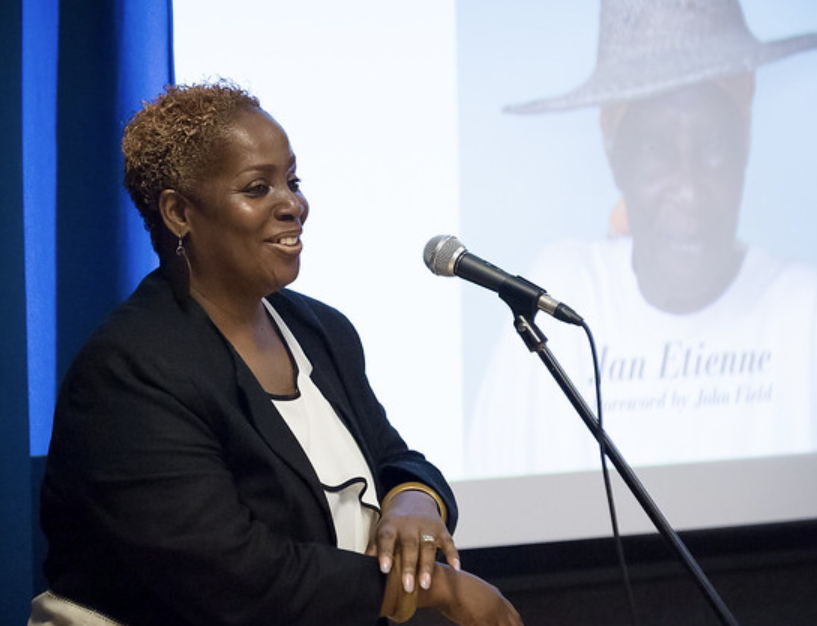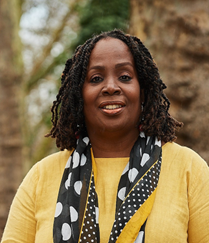October is Black History Month, which recognises and celebrates the invaluable contributions of black people to British society. This year’s theme is ‘Saluting our Sisters’, which pays homage to black women. Read the remarkable and inspiring story of Dr Jan Etienne, Honorary Research Fellow (Faculty of Humanities and Social Sciences) who shares some of her earlier experiences through to her current work in black feminist research.
Who is Dr Jan Etienne?
Jan is a distinguished Academic and Honorary Research Fellow, in the Faculty of Humanities and Social Sciences at Birkbeck. She is the author of several academic publications, including the following books: Learning in Womanist ways: Narratives of first generation, African Caribbean women (2016) (UCL Press); Communities of Activism: Black women, higher education, and the politics of representation (2020) (UCL Press); Doing contemporary womanist research (2023) (LPP) and Decolonising the higher education academy; decolonial feminist approaches (forthcoming).
She is a graduate of the School for Policy Studies, University of Bristol, and Chair of Birkbeck’s (Womanism, Activism, Higher Education Research Network where she leads a 22-member strong international team of decolonial feminist activists working together with community activists to promote black women’s activism in higher education research. This research network is supported and funded by the Birkbeck Institute for Social Research.
Jan says, “Collaboration with black women on anti-racist work in education is everything, together we are stronger and collaboratively we can make things happen. This is what celebrating sisterhood feels like to me.
The people who have inspired me along the way include fellow pupils, community activists, teachers, and lecturers who collaborate with me, as well as students from whom I learn a great deal.
I am committed to securing our spaces in higher education to enable us to breathe and heal, in a climate where there is often mistrust and rage. However, it is essential that we collaborate with our fellow anti-racist educators, to learn, act and change.”
Outside of Birkbeck, Jan is Editor for the Gender Studies Collection at Lived Places Publishing, an international education publishing house, based in New York.
Jan was awarded the 2022 Womanist Ethnography prize by the Centre for Womanist Ethnography research from Vanderbilt University at the 5th Annual Womanist Ethnography Conference (Nashville, Tennessee, USA) for her work in promoting and developing black feminist ethnographic research in higher education.
She says: “I believe in promoting the voice of black women activist educators, in collaborative participative research for social justice. For me it is the most powerful educational development in the fight to end systemic and structural racism. Like black women on the frontline of community activist work, ‘we are collaborators, we are leaders, we are negotiators, and we are finding ways to overcome!’ Spaces to share our lived, first-hand experiences are invaluable to help deliver effective anti-racist programmes in higher education.”
Early life in activism
Jan shares, “My earliest awareness of activism was as a working-class pupil attending Rokesley school in Hornsey, North London. At first, I was victimised, and alone – until the journey home, where a seemingly invisible group emerged, powerful. Here, other girls like me came alive as we walked, talked, and shared our pain. In such times, we listened to each other’s voices, and developed ideas in conversations with each other – in solidarity and in sisterhood.
I listened carefully to the words of those who inspired me in this small group. Their commitment to doing something ‘for all of us’ remained with me and set me on my own path to liberate my ways of thinking and doing. Those hurried conversations were taking place ‘alone’ but ‘together’ as we strategized on how we might best cope with what we knew as racism and sexism. Being black, female, and on our way home to attend to family chores, we became bolder, stronger, braver, and prepared to face the world.
“Clinging to our sisters for survival was everything. Today it is still everything.”
——————————————————————————————————————————————
Upcoming event
Jan will host this year’s Womanism, Activism, Higher Education Research Network conference on Tuesday 31 October, 1.00 – 4.30pm. The theme under discussion is: ‘Sharing good practice in doing Black feminist research for community’.
Read more details and book tickets for the online conference, here.
Further information
View Birkbeck’s Equality and Diversity initiatives.
Read the oration for Dr Jan Etienne.
Find out more about Birkbeck’s Faculty of Humanities and Social Sciences.
Learn more about Birkbeck’s history and its diverse communities.





